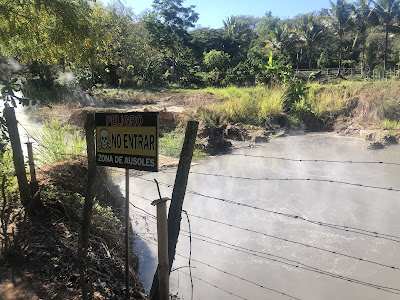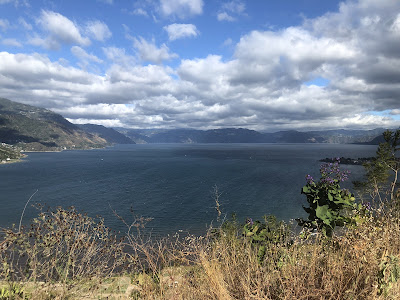It’s been 10 weeks since l arrived in Mexico. That's one month in Mexico and 6 weeks in 4 other countries - Guatemala, El Salvador, Nicaragua, and now, here in Costa Rica. Plus I drove through Honduras on my way from El Salvador to Nicaragua. This is fast. I don't usually travel this way. As implied by the title of my blog, I like to go slowly, like a snail. I like to really get a sense of a place when I go there. I like to feel what it would be like to live in a place, get to know some of the local people, wander the streets less traveled, have time to explore places that you only find out about once you are there, the things you can't plan ahead of time.
But since I decided to volunteer at a 7-day music festival in Costa Rica at the end of February, and because I realized when I got to Mexico, that I was really excited about going to Colombia, I have been experimenting with traveling like a butterfly, flying from one beautiful flower to another, finding the sweetest spots to visit in each country, and then on to the next one, never staying too long in one spot. Sometimes, it's hard to be a butterfly when you have a big backpack to carry around with you everywhere, but I'm getting used to packing up every few days and heading to a new place. Sometimes I have trouble remembering where I was a couple days ago, but with so little time in each place, my focus has been enjoying where I am now because very soon, I will be somewhere else.
Looking back on the last month, it has been quite a whirlwind of beautiful earth spots and new experiences. I already shared a bit about the magical Lake Atitlan in Guatemala. Then I was onto riding the chicken buses in El Salvador. It can be a bit overwhelming to ride these buses, which are actually old school buses from the US, common in Guatemala and Nicaragua as well, as they ore often packed full of people, and it's not always clear where/how to get on and off the buses. Of course, it is just how the local people get around, but for me, it was an entertaining (and sometimes stressful) experience. In El Salvador, especially, many street vendors come onto the bus at the various stops selling not only cold beverages (often in little plastic bags with a straw rather than bottles) and snacks (fruit, yucca and plantain chips, sandwiches, etc...), but also plastic storage containers, sippy cups for kids, clothespins, and even those head massagers with all the metal prongs that feel so good. Sometimes, the vendor will actually stand in the front of the bus and give a little 2 minute commercial about their product. I almost bought the pens with erasers and the toothbrush that folds up into its own little case. And Of course everything is very cheap. It's like a dollar store is passing through the bus all the time.
Then there was the labyrinth I spent an hour being lost in, but did make it to the center and out again, and the hot springs that are so hot they are actually boiling, so you have to go to the resort where they have pools and cafes and they cool the water down of course. Then on to Nicaragua - I spent a week here on Ometepe, an island in the middle of the biggest lake in Central America, where I'm reminded for the millionth time in my life how much happier and calmer I feel when I am in nature, outside of the city, and also how much I love islands. I stayed in a beautiful bamboo cabin yards, or should I say meters, away from the lake. Most people rent motorcycles or ATVs to get around this island made by 2 volcanoes, but I chose to get around by walking and bus. One day, I accepted a ride from a local tour guide on his motorcycle. He promised me he would go really slowly, and he did. He dropped me off at a beautiful swimming hole. The next day, I joined his tour hiking halfway up the smaller volcano to an amazing viewpoint. I think this island is my favorite stop so far and would love to return one day.
Then across another border into Costa Rica, which has been full of beautiful beaches, visiting friends who have moved here from the US with their children, a beautiful town in the mountains with so many hummingbirds, and volunteering at Envision. Tomorrow, l am off to volunteer at a biological station/lodge for 2 weeks in the deep jungle of the Osa Peninsula before I head to Panama where I'll be getting on a sailboat for 5 days, stopping at islands along the way, and arriving in Colombia on April 1st.
Here are some pictures of the last 6 weeks:

















































